The new year holds the promise of great innovations and inventions, says Ashish Narsale.

Qualcomm Snapdragon 845 Photograph: Courtesy qualcomm.com
Qualcomm Snapdragon 845
The heart of all the devices is its chipset or the System-on-Chip (SoC).
At the end of last year, we saw the unveiling of Qualcomm's Snapdragon 845 chipset.
Snapdragon 845 leaps ahead of its predecessors; it's not only faster and more power efficient, but also built with dedicated powers to serve AI, security, faster internet speed.
This 845 SoC will feature in most upcoming flagship devices.

ASUS NovaGo Photograph: Courtesy asus.com
The 'Always Connected PC'
Along with the announcement of 845 SoC, Qualcomm also announced the 'Always Connected PC', a laptop that you never have to shutdown. It will remain connected even on standby, just like your mobile phone.
The laptop will also have longer battery life of approximately 22 hours.
The Always Connected PC is built by Qualcomm in collaboration with Microsoft for OS and Software, Asus, HP and Lenovo for Hardware.
The laptops already announced are ASUS NovaGo TP370QL and HP ENVY x2; Lenovo is yet to announce one.
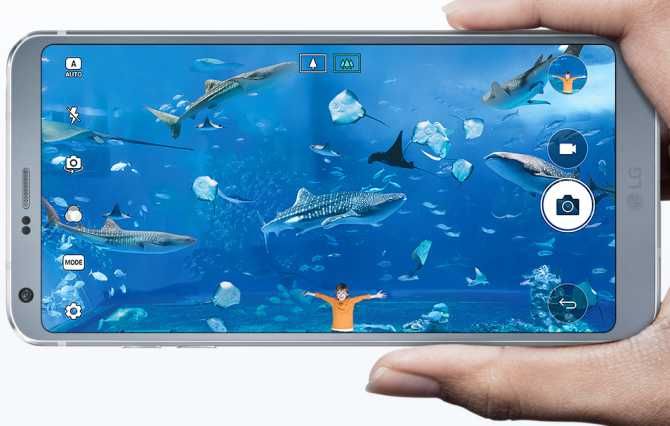
LG G6 Photograph: Courtesy lg.com
LG G7 and G7+
Last year, LG G6 -- which was the first to adapt 18:9 aspect ratio full-vision display, now a standard used by almost all flagship phones -- missed the latest Qualcomm's Snapdragon 835 chipset, but this time around this won't be the case.
It will be interesting to see how LG uses the 845 SoC to build an AI enabled phone like LG G7.
And it won't be a long wait. LG may announce it in the upcoming Consumer Electronics Show (CES 2018), being held from January 9 to 12 in Las Vegas, or at the Mobile World Congress (MWC 2018), being held from February 28 to March 1 in Barcelona.

Samsung S8 Photograph: Courtesy samsung.com
Samsung Galaxy S9 and S9+
The Samsung Galaxy S series have been the best Android devices built up till date.
If rumors are to be believed, the S9 and S9+ will follow the same 18.5:9 infinity display.
The renders from YouTuber Concept Creator suggest that the two variants will have a single and dual camera in the rear, respectively.
The long talked about fingerprint scanner will also find its place at the rear, below the camera module.
Both S9 and S9+ will run on Qualcomm's latest Snapdragon 845 SoC in the US and Exynos 9810 in the rest of the world.
The S9 and S9+ is expected in the first quarter, rumors say either at CES 2018 or MWC 2018, but going by Samsung's history, the technology giant might have a special launch event at the end of February end or beginning of March.

Apple iPhone X Photograph: Courtesy apple.com
Apple iPhone 9 or iPhone XI
Last September, we saw Apple launch its revolutionary iphone X on its 10th anniversary.
The phone was almost all display and skipped the fingerprint scanner for a facial unlock, which was not appreciated by most users.
We hope that all the issues are laid to rest in its next iteration -- whether it is called the iPhone Xs or iPhone 9 or iPhone XI -- which is expected to be unveiled along with iPhone 8s and 8s Plus, running on more advance A12 chipset, in the third quarter.
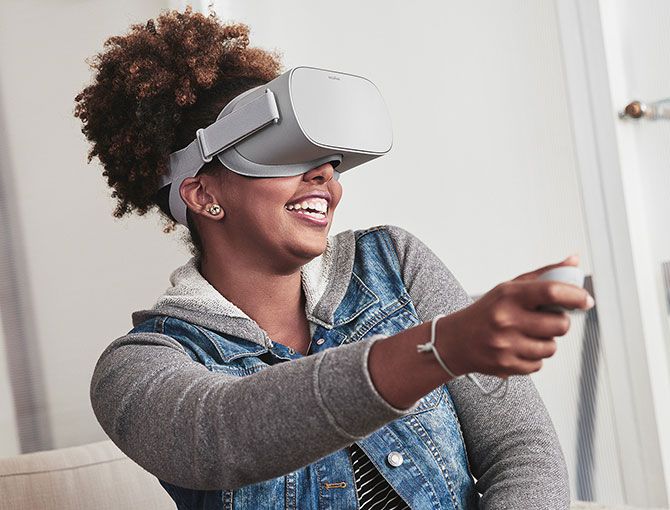
Oculus Go VR Photograph: Courtesy oculus.com
Oculus Go VR headset
Oculus Go VR is a standalone Virtual Reality (VR) headset that doesn't have to be attached to a mobile phone or a PC. It also has its own display.
Oculus, a Facebook-owned company, has developed this VR to be made affordable at the price of $199 approx ₹12,650.
Oculus GO VR will be available early this year.

Arizona State University and HP's early experiment with flexible display. Representational Photograph: Courtesy Courtesy US Army RDECOM/Creative Commons
Samsung Galaxy X
Samsung Galaxy X is the foldable phone that was supposed to be unveiled in late 2017, but wasn't.
Samsung has been working on it for six years now, and we expect it to unveil it this year.
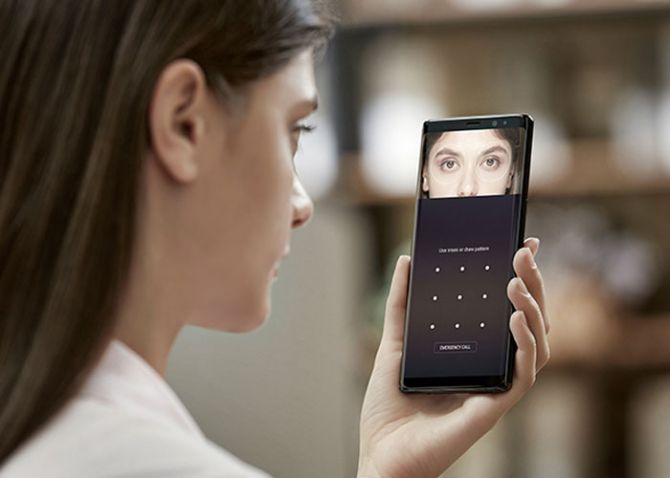
Samsung Note 8 Photograph: Courtesy samsung.com
Samsung Note 9
Samsung Note 8 was the first phone from Samsung to feature a dual camera setup.
This year, Note 9 is expected to have an onscreen finger print scanner and run on Qualcomm's Snapdragon 845 SoC in the US and Exynos 9810 in the rest of the world.
Looking at the history of Samsung releases, Note 9 will be official towards the end of the second quarter.

>Apple HomePod Photograph: Courtesy apple.com
Apple HomePod
The Apple HomePod is in competition to Amazon's Echo and Google's Home smart wireless speakers.
HomePod is powered by Apple's smart assistant Siri and is expected to cost ₹22,200 approximately.
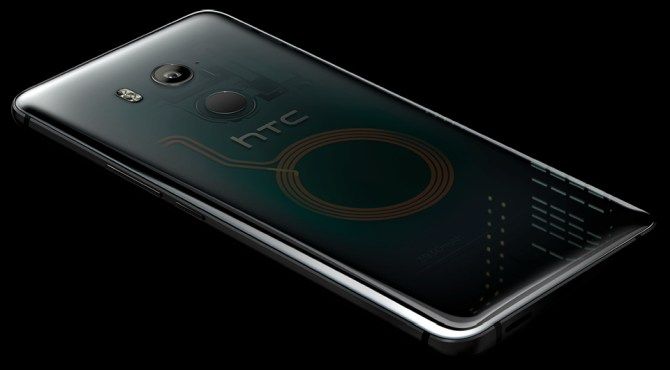
HTC U11+ Photograph: Courtesy htc.com
HTC U12
The trend setter seems to be back in the game after the launch of HTC 11+. Its squeeze gesture has been trendsetting for Google Pixel 2 and Pixel 2 XL as well.
We hope to see an even better phone with new innovations as in HTC U12 at the end of this year.

OnePlus 5T Photograph: Courtesy oneplusstore.in
OnePlus 6
OnePlus, the phone with high-end specs at a pocket-friendly price, has slowly become a choice for many.
We expect to see OnePlus 6's dual camera with Optical Image Stabilization (OIS) and Electronic Image Stabilization (EIS). It is obvious that OnePlus will be using the Qualcomm's latest AI-enabled Snapdragon 845 SoC.
The expected release is in June 2018. But if you can wait for five more months, you can have your hands on OnePlus 6T, which is supposed to be a better version of OnePlus 6.
![]()
Google Pixel 2 Photograph: Courtesy store.google.com
Google Pixel 3 and Pixel 3 XL
Last year, Google Pixel 2 and Pixel 2 XL had the best camera among its counter parts.
As Google is more inclined towards Machine learning and AI, it will be interesting to see what it makes using Qualcomm's Snapdragon 845 SoC.
Google Pixel 3 and Pixel 3 XL are expected to come in October 2018.

LG ThinQ OLED TV Photograph: Courtesy lgnewsroom.com
LG ThinQ OLED TV
Television resolutions are getting higher and higher and TV is becoming thinner and thinner.
After unveiling its 77-inch wallpaper TV for ₹ 29,99,990 last year, LG is now set to showcase its LG OLED 8K in CES 2018.
That's not all.
AI is also coming to your TV as well; LG will be showcasing its own ThinQ AI amd α (Alpha) 9 processor enabled OLED TV at upcoming CES 2018.
The α9 processor is used to improve image quality, while ThinQ AI will enable users to interact with the TV with their own voice.
Some countries will also have Google Assistance integrated in the TV, making it act as a smart Hub to connect other smart devices.
LG has already been selling SmartThinQ-enabled devices like refrigerators, washing machines, vacuum cleaners, air conditioners and air purifires. The SmartThinQ app allows one to manage all Wi-Fi enabled smart devices though one app, which is available for Android and IOS.
Other then LG's own ThinQ AI, these devices are also compatible with third-party AI services like Google Assistant and Amazon Alexa.
 Photograph: Courtesy oculus.com
Photograph: Courtesy oculus.com









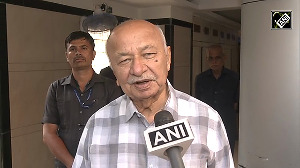

 © 2025
© 2025